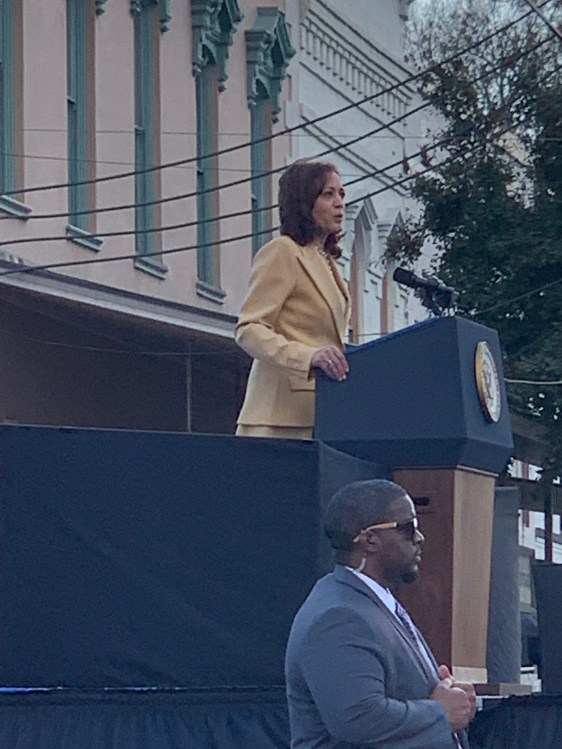


Special to the Democrat by John Zippert, Co-Publisher
Vice-President of the United States, Kamala Harris, was the keynote speaker at a rally at the foot of the Edmond Pettus Bridge, in Selma, Alabama on Sunday March 6, 2022, to mark the 57th anniversary of the ‘Bloody Sunday’ March, which led to the passage of the Voting Rights Act of 1965.
Harris and many other civil rights and U. S. cabinet officials said it was critical to commemorate this anniversary because Black, Brown, poor and young people had a better chance to vote in 1965, after passage of the Voting Rights Act, than they have today, when the right to vote is under challenge, as part of a larger attack on democracy.
“In 2020, despite the pandemic, we had a record turnout of voters, which helped to elect President Biden and myself. As a result, the Republicans have launched an assault on the freedom to vote. They have passed and are working on passing legislation in over 30 states to make it more difficult to vote.
“Every Republican Senator voted against passage of the John Lewis Freedom to Vote Act, when it came up for a vote earlier this year. We have no choice, we must stand and fight for the right to vote and we must fight with determination, even in the face of arcane rules, like the filibuster,” said Harris.
The Vice-President was accompanied to Selma by her husband, Doug Emhoff, the second gentleman, and five Biden Administration cabinet members, including: HUD Secretary, Marcia Fudge, Education Secretary, Miguel Cardona, Transportation Secretary, Pete Buttigieg, Michael Regan, Environmental Protection Agency head and Donald Remy, Deputy Secretary of Veterans Affairs.
After her talk, she joined a group of three hundred civil rights leaders, local foot-soldiers, public officials, cabinet members and others at the front of the march across the bridge. Over 10,000 or more other marchers, who had started from Browns Chapel Church, followed behind a line of Secret Service, law enforcement and other security officials protecting the Vice-President and five cabinet officials, who traveled to Selma with Harris and also spoke at the rally.
Sunday’s march re-enactment and protest for revitalizing the Voting Rights Act came at the end of the Bridge Crossing Jubilee weekend, which featured more than 30 activities including a parade, banquet, several breakfasts, many workshops, a golf tournament and other related events.
“The Selma Bridge Crossing Jubilee is the largest civil rights and voting rights activity in our nation. Some of our activities were virtual and others were curtailed and impacted by the pandemic, but we still had large crowds of engaged people, which was our goal,” said Hank Sanders, cofounder with his wife Faya Rose Toure (Sanders) of the Jubilee, more than 30 years ago.
Many of the speakers, related the struggle for voting rights in our country, to the struggle to defeat the Russian invasion of Ukraine and preserve democracy in that eastern European country.
Sherrilyn Ifill, Director of the NAACP Legal Defense Fund, after recounting the attacks on voting rights by the Supreme Count and state legislatures, said, “What we do in Selma, in Washington, D. C., Fulton County, Georgia, will have global implications. Black people must save democracy and we must make our country better.”
Latosha Brown, co-founder of Black Voters Matter said, “We are winning, we voted in record numbers in 2020. The turnout was younger, browner and more diverse than ever. This is what generated the attacks on voting rights and this is why we must continue to fight.”
Rev. Jesse Jackson, assisted by his son Jonathan Jackson, Bishop William Barber of the Poor People’s Campaign, Barbara Arnwine of the Transformative Justice Coalition, Derrick Johnson, NAACP, Melanie Campbell of the Black Women’s Roundtable, Rev. Al Sharpton of the National Action Network, Charles Steele of SCLC, Congresswoman Terri Sewell and many other members of the Black Congressional Caucus were present and gave remarks.
Many of the civil rights leaders were in town for the Bridge Crossing Jubilee, because they agreed to work jointly to continue the march from Selma to Montgomery, this week (March 7-11). They felt the necessity to illuminate the challenges to the Voting Rights Act and engage people in the 2022 mid-term elections to work for passage of the John Lewis Voter Advancement Act, in future sessions of Congress.







